Making your own natural, homemade laundry detergent is one of the easiest parts of a transition to natural living. This natural laundry soap recipe a great way to save money on laundry detergent and is incredibly easy to make. This homemade laundry detergent post is an updated version of this recipe that addresses high efficiency washers and borax safety.
Why Switch to Natural Laundry Soap?
Conventional laundry detergent is loaded with chemicals like sulfates, fragrances, phenols and more. Many brands contain things like petroleum distillates, which are linked to cancer and lung disease. Fragrances in these detergents are made of a mix of harmful chemicals. (This is also why I make my own linen spray.)
Luckily, making your own laundry soap is an easy and fast process! You only need three basic ingredients to make either a powdered or liquid laundry soap:
DIY Laundry Soap Ingredients
- Washing Soda (Arm and Hammer Brand available at most stores)
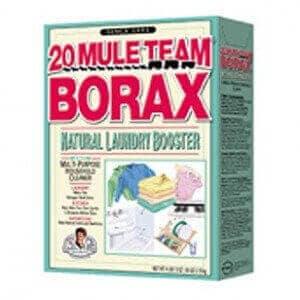
- Borax (20 Mule Team Borax available at most grocery stores)
- Bar Soap (Dr. Bronner’s, Ivory, or other natural, unscented bar soap)
Washing Soda and Borax should be available at your local grocery store on the laundry aisle. Natural bar soaps are in the health, beauty, or organic sections of the store, or online. You can also add a couple tablespoons of baking soda to help freshen clothes.
Wonder What’s in These Ingredients?
Borax is a naturally occurring mineral made up of sodium, boron, oxygen, and water. It is an ingredient in most of the natural soaps available now (Seventh Generation, etc.) but it is much more inexpensive to make yourself. There are some concerns about the safety of Borax, but here’s why I feel comfortable using it, especially for laundry.
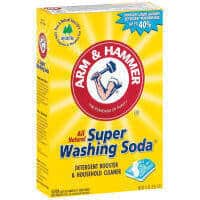
Washing Soda, sometimes called sodium carbonate or soda ash, is made from common salt and limestone or found as natural deposits. If you can’t find this locally, you can make your own from plain baking soda with this tutorial. Here are some other great household uses for washing soda.
Dr. Bronner’s soaps are fair trade and made with vegetable castile soap and pure organic oils.
Natural Laundry Soap Recipe
Materials
- 1 bar soap (such as Dr. Bronner’s Pure Castile Bar Soap or homemade coconut oil soap)
- 1 cup washing soda
- 1 cup borax
Instructions
- Grate the bar of soap or chop it in a food processor until finely ground.
- In a large bowl, mix together the grated soap, washing soda, and borax.
- Store in a sealed container.
- To use: add 2 tablespoons to ¼ cup of soap per load of laundry.
Notes
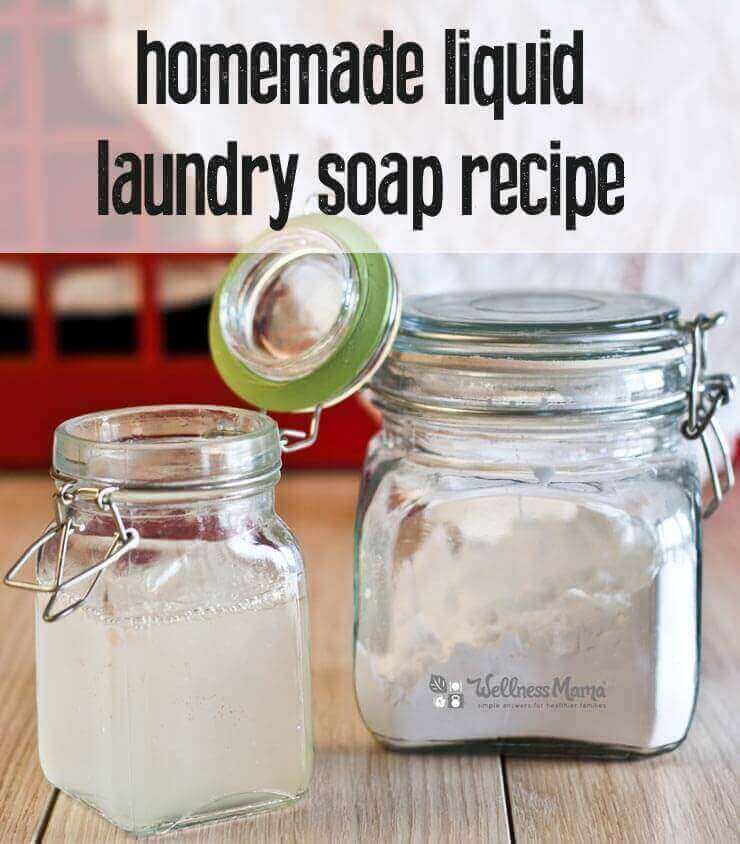
How to Make Liquid Laundry Soap
- Grate one bar of soap with cheese grater or food processor.
- Put grated soap in pan with 2 quarts water and gradually heat, stirring constantly until soap is completely dissolved.
- Put 4.5 gallons of really hot tap water in a 5-gallon bucket (available for free in bakeries at grocery stores, just ask them) and stir in 2 cups of borax and 2 cups of Washing Soda until completely dissolved.
- Pour soap mixture from pan into 5-gallon bucket. Stir well.
- Cover and leave overnight.
- Shake or stir until smooth and pour into gallon jugs or other containers.
- Use 1/2 to 1 cup per load.
These recipes are also a great way to save money on laundry. By my calculations, I am saving over half on my laundry bill by switching
A Note About Soap vs. Detergent
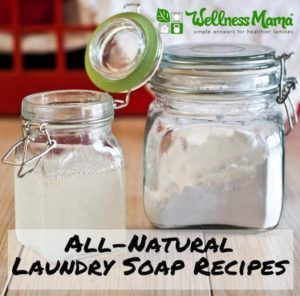
As mentioned above, there is chemically a difference between soap and detergent. The advantage of conventional laundry detergents is that they are formulated to work specifically in washing machine environments. Many soaps are designed for skin and are not as strong. Some sources suggest that over time, natural soaps can leave buildup in washers.
I’ve found that while this recipe works well for me, it isn’t suitable for all water types and washer types. If you’ve used natural laundry soap and experienced clothes getting dingy, this may be the reason.
I’ve found one natural detergent that works brilliantly and can be used alone or in combination with homemade laundry soaps like this one. I often add 2-3 Tablespoons of Dr. Bronners Sal Suds per load as a natural detergent. Sal Suds gets out tough stains and odors and is still a natural product (though technically a detergent/surfactant and not a soap).
Don’t Want to Make it?
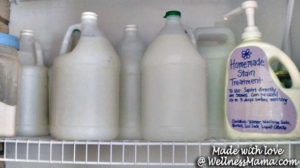
We usually make our own detergent, but for times when we are traveling or I haven’t had time to make it, I’ve found a few good brands of eco friendly laundry detergent that actually work (all received an “A” by the Environmental Working Group):
- My Green Fills Laundry Detergent – Just a warning… after you try this laundry soap, you may be ruined for DIY forever. This is the best smelling non-toxic laundry detergent I’ve tried and it works well on tough stains and dirt. Similar to my favorite all-purpose cleaner, a huge bonus is their eco-friendly approach. The detergent comes concentrated in a small refill packet (hence the name) which you add to warm water in the provided bottle. Super smart!
- 2 tablespoons Sal Suds + 1/4 cup Baking Soda or Washing Soda (highly effective and super simple!)
- Ecover Zero Laundry Detergent– Works well, relatively cost effective and low/no risk of developmental or reproductive toxicity and cancer according to the EWG.
- Emma Eco Me Detergent – Also rated well by the EWG and cleans up to 64 loads for $12. Good scents.
- Planet Natural Detergent – Relatively eco-friendly and cost effective at $9 for 32 loads.
Obviously, the most frugal option is to make your own, but these natural alternatives are a good choice if you aren’t able to make your own or don’t want to.
Have you tried making your own laundry detergent? What ingredients did you use?
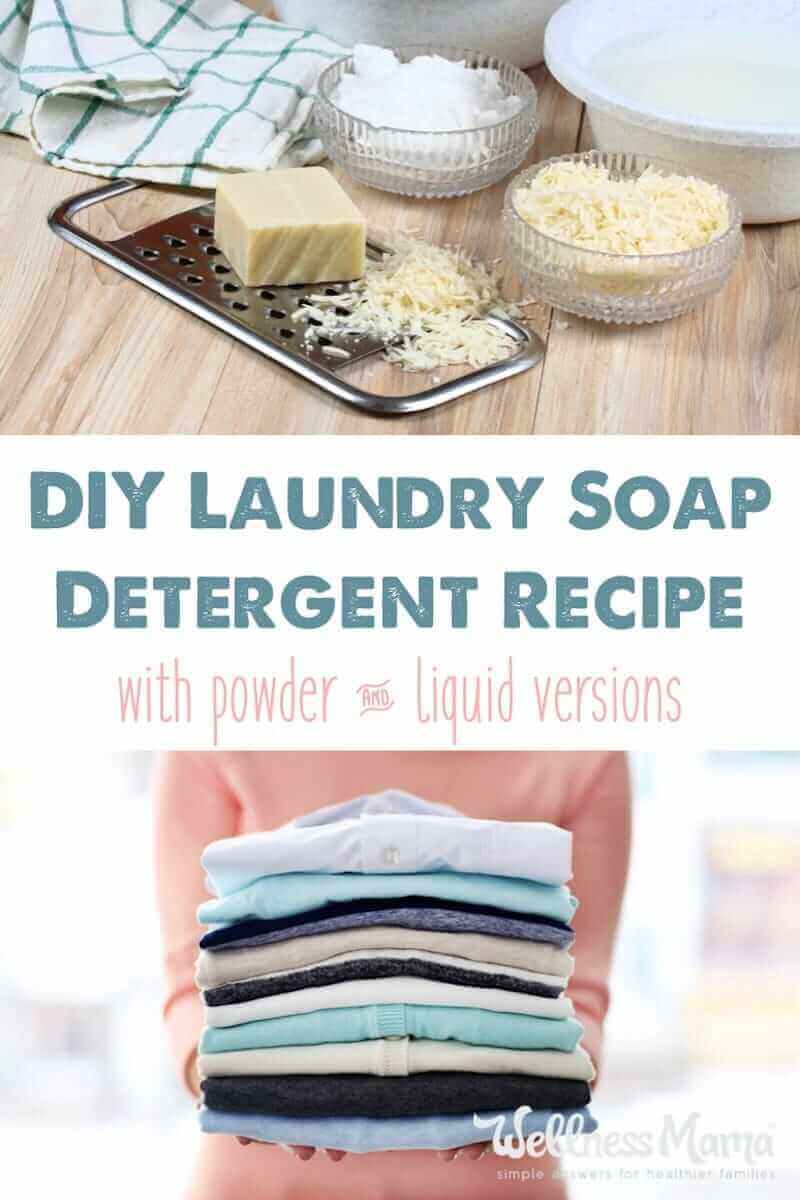

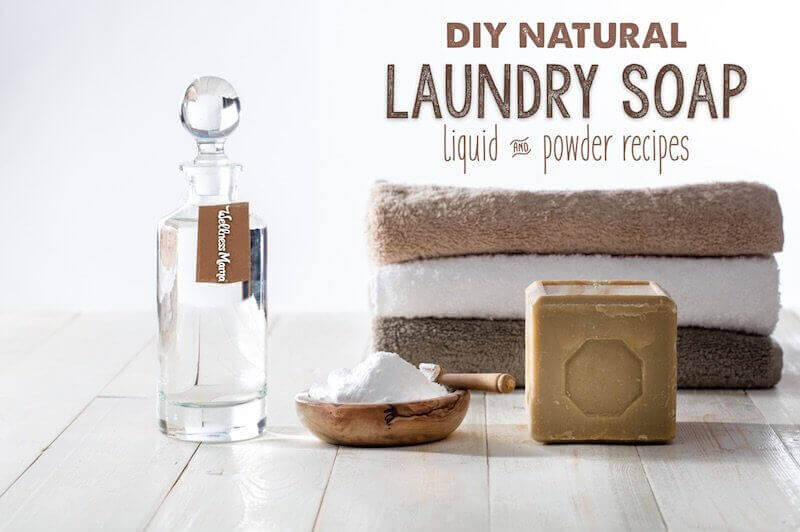
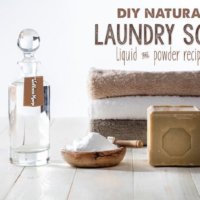
Leave a Reply